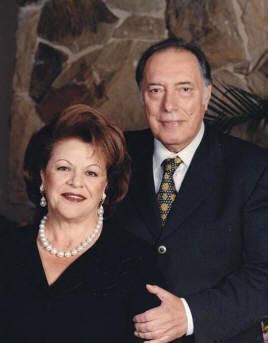
Mehdi (Mashiach) Hariri Tolu — merchant, philanthropist, the head of the Tehran Textile Merchants Association, and the deputy of Tehran City Council
Mehdi Hariri Tolu was born in 1925 (1304 Solar Hijri) into a devout and wealthy Jewish family in the city of Mashhad.
His birth coincided with the establishment of the Pahlavi dynasty and the relative freedoms granted to the Jewish community in that era. His father, Ibrahim Agha Hariri Tolu, was a benevolent and trusted member of the Mashhad Jewish community. The family moved to Tehran six months after Mehdi’s (Mashiach) birth.
He completed his primary education at Jamshid Jam Elementary School. He completed his secondary education with a few of his fellow Jews at the Zoroastrian school Firuz Bahram High School. Once graduated, he immediately entered the job market with his father’s help. Mehdi quickly climbed the ranks thanks to his father’s esteemed position in the Tehran market — he was known for his reputation and credibility among various trades, government officials, and religious scholars. While studying, he spent his free time working in a textile shop on Lalehzar Street, obtaining valuable initial experiences.
After completing his secondary education, Mehdi was obliged to learn Hebrew, Torah, Talmud, and other principles of Jewish religious law under the guidance of the late Professor Yousef Dilmani.
In 1945 (1324 SH), at the age of 20, Mehdi married Victoria from the Nasrallah family. They had a daughter named Arezoo. Following the establishment of his family, he founded a shop in the heart of Tehran in 1950 (1329 SH). With his expertise, unwavering commitment, and tireless efforts in business, he achieved exceptional success across various trade sectors. Through expansion in the textile industry, engaging in the buying and selling of fabrics, and organizing exhibitions related to drapery, he earned distinct credibility among the traders of Tehran, swiftly rising to prominence. He was elected as the head of the Tehran Textile Merchants Association among eleven thousand merchants in the initial round of trade union elections.
In his connection with the Mashhadi community, he followed in the footsteps of his father and grandfather, actively engaging in social and philanthropic activities whenever possible. With his unique human qualities and love for Jewish history and culture, he made significant contributions to various charitable endeavors.
Over the course of more than thirty-five years in business, Mehdi Hariri Tolu earned the trust of both market traders and governmental authorities through his impeccable services. Following the White Revolution in 1965 (1344 SH) and the formation of the Rastakhiz Party, he was appointed by the Prime Minister as the head of the Supervisory Board for the parliamentary elections, for which he was awarded the Order of Homayoun after the elections.
Among his other positions, he was re-elected as the deputy of Tehran City Council, a member of the Iran Novin Party, a member of the Rastakhiz Party, the head of the Inspection Commission, and the head of the Dispute Resolution Commission.
Through his government services, Mehdi Hariri Tolu was honored to receive a total of six Medals of Merit (Order of Homayouni). Following the revolution in 1978, Mehdi and his family migrated to the United States.
In New York, he joined the Mashhadi Jewish Association when the Shi’rah Tovoo synagogue was being constructed and joined the synagogue’s board of directors. He commenced his social activities as an active synagogue board member. The fruitful efforts of the board members inspired him to establish a synagogue named Kolbeh Synagogue in the Great Neck area with the assistance of philanthropists from the Mashhadi Jewish community in 1990.
Over a period of eight years under the management of Mehdi, Kolbeh Synagogue managed to collect more than 7 million dollars through public contributions, including weekly and special-days donations. Simultaneously, due to the increasing population of Mashhadi Jews in New York, and with his proposal and the available budget of Kolbeh Synagogue, a cultural complex called Mashhadi Jewish Center was established. Initially, a group of philanthropists formed a company with Mehdi Hariri called Hayy Company and purchased the land that is the current location of this cultural complex. Subsequently, they founded the organization Mashhadi Jewish Great Neck, obtained the necessary permits for the building, and later transferred the management and completion of the construction to this institution after the establishment of the new central association.
Finally, in 1998, the largest cultural and religious center of the Mashhadi community in New York was established, and Mehdi Hariri Tolu was elected as a member of the Board of Trustees of the Mashhadi Community in the United States.
Through establishing this center, the Mashhadi Jewish community revitalized its organizational efforts after a two-decade hiatus. They have fostered a stronger sense of unity while upholding their ancestors’ spiritual values, traditions, customs, and cultural heritage.
After more than half a century of fruitful efforts, Mehdi Hariri Tolu passed away in November 2008 at the age of 80, corresponding to the Hebrew date of 12 Cheshvan 5769. In his final days, he made a commitment to donate one million dollars to the central fund of the Mashhadi Community Association, which, with the generosity of his family, increased to a sum of one million and two hundred thousand dollars.
